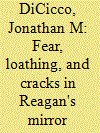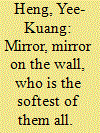| Srl | Item |
| 1 |
ID:
106270


|
|
|
|
|
| Publication |
2011.
|
| Summary/Abstract |
Investigation into an often-overlooked Cold War episode reveals a tipping point in the Reagan administration's approach to the Soviet Union. In November 1983, NATO military exercise "Able Archer 83" reportedly touched off a crisis atmosphere among Soviet officials who feared a surprise nuclear attack. Intelligence reports about the war scare startled US President Ronald Reagan, altering his understanding of Soviet threat perceptions and prompting him to embrace his moderate advisers' recommendations that the administration take a more conciliatory approach toward the country Reagan had earlier labeled the "evil empire." By highlighting Soviet fears of the United States, intelligence stemming from Able Archer 83 cracked Reagan's mirror images and catalyzed a policy shift from hostile confrontation toward cautious cooperation. The case study identifies facilitating conditions for the shift and yields counterintuitive insights relating to international crises, perception and misperception, and the domestic politics of rivalry.
|
|
|
|
|
|
|
|
|
|
|
|
|
|
|
|
| 2 |
ID:
094991


|
|
|
|
|
| Publication |
2010.
|
| Summary/Abstract |
As states jostle to attract and entice others by deploying a range of innovative strategies, a 'soft' power competition era looms possibly in the Asia-Pacific. This paper argues that reflecting on this period of competitive policy innovation provides a valuable opportunity to re-assess the theory and practice of Joseph Nye's 'soft' power, given its conceptual and empirical frailties: how theoretically precise are the policies commonly described as projecting 'soft' power? To do so, it undertakes a comparative evaluation of Japan's and China's 'soft' power strategies. By paying close attention to the theory-practice linkage, it illuminates the disparities in their understanding of Nye's 'soft' power. Rather than a one-size-fits-all concept, 'soft' power strategies with distinctively Japanese and Chinese characteristics are emerging, bringing different advantages and weaknesses. The proverbial magic mirror would conclude that by more closely matching Nye's formulations and displaying a less competitive streak, Japan appears the 'softer' power.
|
|
|
|
|
|
|
|
|
|
|
|
|
|
|
|